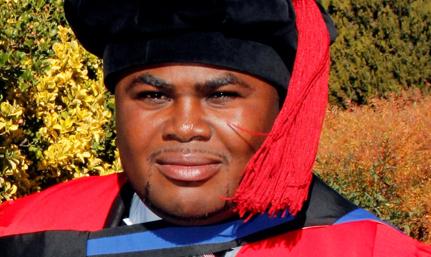|
 |
Abdon Atangana
13 September 2013 |
Postdoc student Abdon Atangana (27) in the Institute for Groundwater Studies (IGS) brings a new dimension to the word ‘productive’. Since the beginning of this year he has published 23 articles in accredited journals. He is also guest editor in two reputed scientific journals.
Atangana – originally from Cameroon – enrolled at the UFS in 2009, finishing his BSc Honours in Applied Mathematics in one year. By the end of 2010 he could add MSc in Applied Mathematics to his CV. If this was not an accomplishment enough in itself, he passed both degrees cum laude. In 2011 he tackled his PhD in Geohydrology and submitted his final thesis in January 2013 – being the youngest PhD graduate at the Winter Graduation.
Besides his impressive publishing success, an additional 28 of his papers are currently under review by international journals in Applied Mathematics.
Atangana’s accomplishments in the publishing arena are phenomenal. He is lead guest editor for the special issue on Theory, Methods, and Applications of Fractional Calculus in The Scientific World Journal. He is also guest editor for the special issue on Analytical and Numerical Approaches for Complicated Nonlinear Equations in Abstract and Applied Analysis.Furthermore, he has been appointed on the editorial board of New Trends in Mathematical Sciences and is a reviewer for nine international accredited journals in Applied Mathematics.
This extraordinary academic has already presented papers on international conferences in America, Turkey and Thailand as well.
Atangana is truly the embodiment of the UFS’ core value of inspiring excellence.